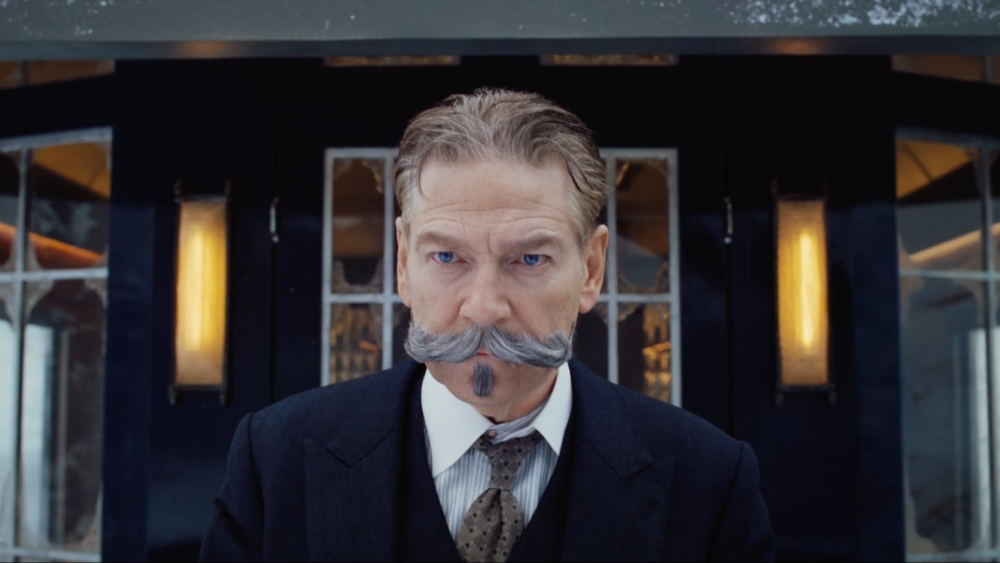
“Vanity project,” generally speaking, is a term reserved for projects wholly conceived by their most prominent artists. This is not the case with the new Murder on the Orient Express, which 20th Century Fox announced two years before hiring director Kenneth Branagh. Yet watching the film, it’s hard not to think Branagh only took the job so he could play Hercule Poirot. His take on Agatha Christie’s detective, an almost cartoonish snob obsessed with order, attempts to define the character with dire bits of comedy before gradually sliding into drab self-seriousness as the film progresses. He’s the kind of person who, when his right foot steps in shit at the beginning of the movie, his left must follow suit for the sake of symmetry. Later, and routinely, the film returns to Poirot crying over the portrait of an old lover. This, the movie’s invention, attempts to imbue the character with a shred of humanity at odds with his cold, detached demeanor. Branagh and writer Michael Green want to have it all in a single character and so make Poirot more empathetic and, in the film’s conclusion, enlightened. With a more magnetic personality in the lead and a strong script, it just might work. But nothing about Branagh here is inherently gripping to watch outside of his ridiculous mustache, which looks like a bad mustache grew a mustache. And this take on Christie’s mystery is less one of Poirot’s greatest, most challenging cases and more a self-serving testament to the detective’s greatness.
After a totally unnecessary but intermittently amusing prologue in Jerusalem, Hercule Poirot finds himself aboard the Orient Express with a small group of strangers, almost exclusively played by very famous people–I mean, relative newcomer Daisy Ridley is the star of fucking Star Wars. After one of their rank is murdered during an avalanche that strands the train, Poirot, who would rather stick to his cabin and read Charles Dickens, is called upon to solve the mystery before the police arrive, lest they immediately hang either Leslie Odom Jr.’s John Arbuthnot or Manuel Garcia-Rulfo’s Biniamino Marquez on the basis of their race. It’s a curious addition to the story, though not one that rings false. This sort of racial scapegoating is familiar to anyone who has any knowledge of history, pop culture or current events. But when race is otherwise invoked only superficially, as when Willem Dafoe’s Austrian professor spouts something performatively racist, this new motivation for Poirot seems designed only to bolster his heroism in the eyes of an audience. With lives on the line, Poirot sets off on his investigation.
From here, he embarks on a slapdash series of interviews, uncovering the secret histories of each of the train’s passengers. These unremarkable scenes proceed arrhythmically and indistinctly, from one passenger to the next as Poirot performs surely complicated, but unseen mental gymnastics to piece the information together. An effort is made here to ensure that character psychology carries more weight than methodology. But that this is conveyed entirely through bland, black and white flashbacks renders the emotional drama as inert as the mystery.
In one of the apparently more important interviews, Ridley’s Mary Debenham remarks that Poirot is carefully choosing the location of his interviews to influence their outcomes. What exactly she means isn’t clear. Her interview is conducted outside of the train, in the snow, but this, like many of Branagh’s trips outside, just seems like an excuse to show off his 65mm footage. And in Poirot’s indoor interrogations, space hardly seems to matter at all. With the notable exception of a blurry tracking shot along the outside of the train when Poirot first boards, rarely if ever does the film show a character move from one car of the Orient Express to another. The space of the train is so ill-defined as to become formless and without meaning. At times, the director seems to be afraid to work in the confines of this space. Instead of blocking three actors in a tight hallway, a feat managed by many before, Branagh opts to shoot from above and hold on a triangle of men for an eternity. What is cinema if not the hastily arranged tops of men’s heads?
Poirot must be, as he says, “the greatest detective in the world,” because the investigation gives him hardly any trouble at all. Occasionally, the sleuth will pay lip service to this humdinger of an enigma, but the experience of Murder on the Orient Express is not one of watching a great investigator work. Instead, it’s more akin to seeing an asshole with a ridiculous moustache stumble into exposition until arriving, somehow, at the correct conclusion.
—
Directed by Kenneth Branagh; written by Michael Green; based on the novel by Agatha Christie; starring Kenneth Branagh, Penelope Cruz, Willem Dafoe, Judi Dench, Johnny Depp, Josh Gad, Derek Jacobi, Leslie Odom Jr., Michelle Pfeiffer, and Daisy Ridley; 114 minutes.



 Derek
Derek
 Isabelle
Isabelle